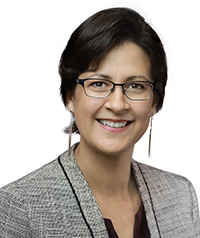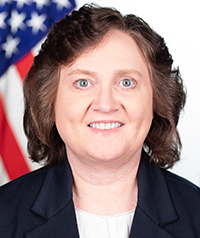Accelerating the Future of AI
Through Investment in Fundamental Research and Beyond
In partnership with the National Security Commission on Artificial Intelligence (NSC AI)
The application of AI has changed the world as we know it in profound ways. This panel discussion will provide insight about the importance of U.S. investment in research, from fundamental to applied, and what the U.S. can do to accelerate AI innovation at home. This session will include panelists that bring together insights from AI experts in government, academia, and industry to highlight the importance of U.S. fundamental research to the future of U.S. competitiveness for decades to come.
Tuesday, September 28, 2021 | 3–4 PM | ET
Moderator
Program Director, National Science Foundation
Dr. Irina Dolinskaya is a Program Director at the National Science Foundation (NSF) in the Division of Civil, Mechanical & Manufacturing Innovation (CMMI). Dr. Dolinskaya services Dynamics, Control and Systems Diagnostics (DCSD) and Foundational Research in Robotics (Robotics) programs, as well as National Robotics Initiative (NRI 3.0) and Navigating the New Arctic (NNA) NSF's 10 Big Ideas. Prior to joining NSF, Irina Dolinskaya was a faculty in the Industrial Engineering and Management Sciences department at Northwestern University. She obtained M.S. and Ph.D. degrees in Industrial and Operations Engineering from the University of Michigan, and B.S. degree in Industrial Engineering from the University of Florida.
Dr. Irina Dolinskaya's research is in the field of transportation science and logistics with a focus on adaptive modeling and solution approaches to integrate dynamic real-time information. Her current primary applications are in: humanitarian logistics, optimal vessel performance, and electric vehicle routing.
Speakers
Kavcic-Moura Professor, Robotics Institute
School of Computer Science, Carnegie Mellon University
Howie Choset is a professor of Robotics at Carnegie Mellon University. Motivated by applications in confined spaces, Choset has created a comprehensive program in snake robots, which has led to basic research in mechanism design, path planning, motion planning, and estimation. These research topics are important because once the robot is built (design), it must decide where to go (path planning), determine how to get there (motion planning), and use feedback to close the loop (estimation). By pursuing the fundamentals, this research program has made contributions to coverage tasks, dynamic climbing, and mapping large spaces. Already, Choset has directly applied this body of work to challenging and strategically significant problems in diverse areas such as surgery, manufacturing, infrastructure inspection, and search and rescue. Choset directs the Undergraduate Robotics Minor at Carnegie Mellon and teaches an overview course on Robotics which uses series of custom-developed Lego Labs to complement the course work. Professor Choset's students have won best paper awards at the RIA in 1999 and ICRA in 2003; his group's work has been nominated for best papers at ICRA in 1997, IROS in 2003 and 2007, and CLAWAR in 2012 (best biorobotics paper, best student paper); won best paper at IEEE Bio Rob in 2006; won best video at ICRA 2011, and was nominated for best video in ICRA 2012. In 2002 the MIT Technology Review elected Choset as one of its top 100 innovators in the world under 35. In 2005, MIT Press published a textbook, lead-authored by Choset, entitled "Principles of Robot Motion." Recently, Choset co-founded a company called Medrobotics (formerly Cardiorobotics) which makes a small surgical snake robot for minimally invasive surgery.
Commissioner, The National Security Commission on Artificial Intelligence
Dr. Andrew W. Moore currently serves as the Director of Google Cloud AI. A distinguished computer scientist with expertise in machine learning and robotics, he served as dean of the Carnegie Mellon University School of Computer
Science from 2014-2018. He had previously served as a professor of computer science and robotics before taking a leave of absence to become founding director of Google’s Pittsburgh engineering office in 2006.
Moore’s research interests broadly encompass the field of “big data”–applying statistical methods and mathematical formulas to massive quantities of information, ranging from Web searches to astronomy to medical records, in order to identify patterns and extract meaning from that information. His past research has also included improving the ability of robots and other automated systems to sense the world around them and respond appropriately
Director, National Artificial Intelligence Initiative Office
White House Office of Science and Technology Policy
Dr. Lynne E. Parker is Assistant Director of Artificial Intelligence at the White House Office of Science and Technology Policy (OSTP). She is detailing to OSTP from her position as Professor in the Department of Electrical Engineering and Computer Science at the University of Tennessee, Knoxville (UTK). She previously served as Interim Dean of the Tickle College of Engineering (TCE) at UTK, and before that was the Associate Dean for Faculty Affairs and Engagement in TCE. She also previously served at NSF as Division Director of Information and Intelligent Systems. She spent several years at Oak Ridge National Laboratory as a Distinguished Research and Development Staff Member. She received her PhD in Computer Science from the Massachusetts Institute of Technology.
Dr. Parker has been on the UT faculty since 2002, and is the founder of the Distributed Intelligence Laboratory at UT, which has conducted research in multi-robot systems, sensor networks, machine learning, and human-robot interaction. She has made significant research contributions in distributed and heterogeneous robot systems, machine learning, and human-robot interaction. Her dissertation research (1994) on ALLIANCE, a distributed architecture for multi-robot cooperation, was the first PhD dissertation worldwide on the topic of multi-robot systems, and is considered a pioneering work in the field. She has published extensively in these areas and has received numerous awards for her research, teaching, and service, including the PECASE Award (U.S. Presidential Early Career Award for Scientists and Engineers), the IEEE RAS Distinguished Service Award, and many UT Chancellors, College, and Departmental awards. Dr. Parker served as the General Chair for the 2015 IEEE International Conference on Robotics and Automation, as the Editor-in-Chief of the IEEE RAS Conference Editorial Board, and as Editor of IEEE Transactions on Robotics. She is a Fellow of IEEE and a Distinguished Member of ACM.





